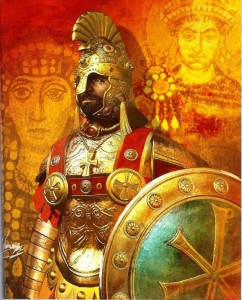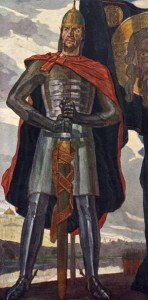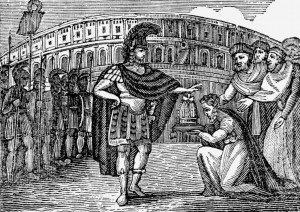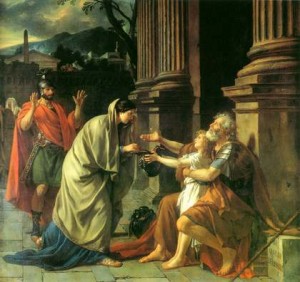 Nate asks where Belisarius was buried. This is sort of the Byzantine equivalent of Princess Di and Mother Teresa dying in the same week. Had the latter expired at any other time it would have made international headlines, but the shock of the tragic royal death drowned out everything else for several weeks in September of 1997. Belisarius was likewise forgotten. He died in the same year as the emperor Justinian and- as if that news wasn’t big enough to overshadow him- the historian Procopius also perished leaving the great general’s final resting place unrecorded. We can, however, make an educated guess.
Nate asks where Belisarius was buried. This is sort of the Byzantine equivalent of Princess Di and Mother Teresa dying in the same week. Had the latter expired at any other time it would have made international headlines, but the shock of the tragic royal death drowned out everything else for several weeks in September of 1997. Belisarius was likewise forgotten. He died in the same year as the emperor Justinian and- as if that news wasn’t big enough to overshadow him- the historian Procopius also perished leaving the great general’s final resting place unrecorded. We can, however, make an educated guess.
Belisarius was tremendously popular throughout his career and lived out his last years on his estates on the Asiatic side of the Bosporus. There were two churches in the vicinity (Saint’s Peter and Paul), and my guess is that he was buried there. You can still visit the area- now the Turkish district of Kadıköy- but there is little to see. Aside from the occasional Byzantine arch or bit of masonry, the Roman past has been largely obliterated. (a disgraceful situation since it is also the site of the famous Council of Chalcedon) Of course Belisarius may still be there. If it was still visible, his tomb was probably destroyed during the Turkish conquest of the area in the 14th century, but the raiders would have had little interest in the bones within. Either they were scattered to mix with the soil, or they are lying in some undiscovered crypt.
I’m choosing to believe the latter.
 Listener Steve asked what (excluding Procopius) are the sources- Byzantine or otherwise- for the life and career of Belisarius?
Listener Steve asked what (excluding Procopius) are the sources- Byzantine or otherwise- for the life and career of Belisarius?
The good news is that there were a lot of historians and chroniclers active during Belisarius’ lifetime, and most of them were aware that they were living through significant times. Procopius stopped writing in 552 and was continued by Agathias Scholasticus till the year 588. He was in turn followed by a man named Menander Protector who decided to write history after he had blown his life savings having a good time. This was evidently a smart career choice as Menander was soon joined by a crowd of writers. If you fancied Justinian’s reign you could pick up bestsellers from Evagrius, John of Epiphaneia, John Malalas, and Marcellinus Comes.
The bad news, however, is that most of these are only partially translated today- or worse exist only in fragments. Unless you know someone at Dumbarton Oaks, you’re probably not going to be able to read them anytime soon. The only commercially available, non-Procopius source is Jordanes. He was a 6th century Roman bureaucrat who had a book collection and the rare gift (as he put it) of being concise. A friend who wanted to read a history of the Goths asked to borrow a copy of Cassiodorus’ (now lost) work, but when he saw its size (12 volumes) he asked Jordanes to sum it up for him. The result is the Getica, which concludes with Belisarius’ brilliant defeat of the Goths in 540.
 Listener Gary asks which of the few books on Belisarius are the best. My favorite is the classic one by Lord Mahon (Philip Henry Stanhope) called ‘The Life of Belisarius’. Originally published in 1829, it’s a bit outdated (it continues the myth of Belisarius’ blinding), but remains the standard if only for want of a serious rival. If you prefer a more modern perspective there is Ian Hughes’ 2009 ‘Belisarius: The Last Roman General’, and if you don’t mind a touch of historical fiction, there is Robert Graves’ (author of ‘I Claudius’) very entertaining- and generally historically accurate- version called ‘Count Belisarius’.
Listener Gary asks which of the few books on Belisarius are the best. My favorite is the classic one by Lord Mahon (Philip Henry Stanhope) called ‘The Life of Belisarius’. Originally published in 1829, it’s a bit outdated (it continues the myth of Belisarius’ blinding), but remains the standard if only for want of a serious rival. If you prefer a more modern perspective there is Ian Hughes’ 2009 ‘Belisarius: The Last Roman General’, and if you don’t mind a touch of historical fiction, there is Robert Graves’ (author of ‘I Claudius’) very entertaining- and generally historically accurate- version called ‘Count Belisarius’.

Reader Bryan asked what I thought of the legend that Belisarius was blinded by Justinian. According to the story, a jealous and fearful Justinian arrested Belisarius after his final victory and had him tried for treason. The loyal general’s eyes were put out, his estates confiscated, and he was forced to wander the streets of Constantinople begging for bread while contemplating the vicissitudes of fortune.
Belisarius did briefly fall out of favor late in Justinian’s reign, but was publicly rehabilitated. The story of his blinding originated in the 12th century with the monk John Tzetzes who was trying to criticize the political figures of his own day. It made for a good morality tale, and was pressed into service in the 18th century by Europeans (mostly French) who saw a parallel between the tyranny of Justinian and their own autocratic societies. (see the spectacular painting by Jacques-Louis David and the play ‘Bélisaire’ by Jean-François Marmontel)
Some scholars still argue that the legend does have some basis in fact (Justinian was certainly capable of it), but there are several reasons not to accept it. The Crusaders who sacked Constantinople in 1204 mentioned several large statues of Belisarius still standing. Had he been blinded and disgraced these surely would have been torn down. Along the same lines there was also a great cycle of mosaics detailing the victories of Justinian and Belisarius above the gate to the imperial palace. These were made during Justinian’s lifetime and were still in place a thousand years later. Finally, there are the writings of the contemporary historian Procopius. In his ‘Secret History’ he makes no mention of the emperor humiliating his general, despite the fact that he clearly hated Justinian and was trying to blacken his name. He accuses Justinian of being a devil in the shape of a man, of being responsible for the deaths of a trillion people, and of having a head that would routinely disappear- but not of harming Belisarius.
Nevertheless the legend persists- perhaps because its lesson still resonates. As Henry Wadsworth Longfellow summed it up neatly in his poem about the great general:
“Ah! Vainest of all things
Is the gratitude of kings.”
 Nate asks where Belisarius was buried. This is sort of the Byzantine equivalent of Princess Di and Mother Teresa dying in the same week. Had the latter expired at any other time it would have made international headlines, but the shock of the tragic royal death drowned out everything else for several weeks in September of 1997. Belisarius was likewise forgotten. He died in the same year as the emperor Justinian and- as if that news wasn’t big enough to overshadow him- the historian Procopius also perished leaving the great general’s final resting place unrecorded. We can, however, make an educated guess.
Nate asks where Belisarius was buried. This is sort of the Byzantine equivalent of Princess Di and Mother Teresa dying in the same week. Had the latter expired at any other time it would have made international headlines, but the shock of the tragic royal death drowned out everything else for several weeks in September of 1997. Belisarius was likewise forgotten. He died in the same year as the emperor Justinian and- as if that news wasn’t big enough to overshadow him- the historian Procopius also perished leaving the great general’s final resting place unrecorded. We can, however, make an educated guess.

